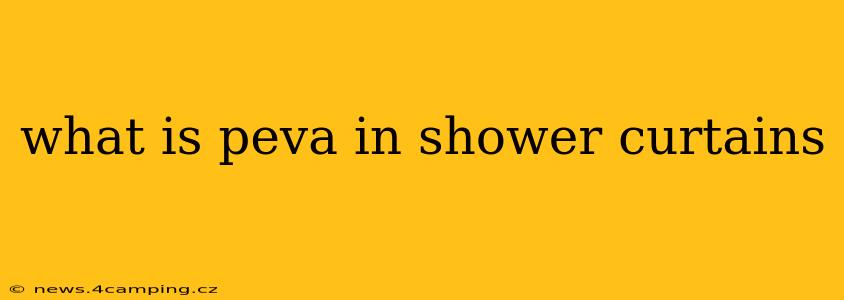PEVA, or polyethylene vinyl acetate, is a common material used in shower curtains, offering a balance of affordability, durability, and flexibility. Understanding its properties is key to making an informed decision when choosing a shower curtain for your bathroom. This guide will delve into the specifics of PEVA, comparing it to other materials and addressing frequently asked questions.
What are the properties of PEVA shower curtains?
PEVA shower curtains are known for their softness and flexibility. Unlike some heavier vinyl options, they are less stiff and easier to maneuver. This makes them a good choice for smaller bathrooms or those who prefer a less bulky shower curtain. They also tend to be relatively lightweight, making them simple to hang and remove for cleaning. Importantly, PEVA is water-resistant, preventing water from splashing onto the bathroom floor. However, it’s crucial to note that PEVA isn’t completely waterproof, so prolonged exposure to water can potentially damage the material over time.
How does PEVA compare to other shower curtain materials?
Several materials are used for shower curtains, each with its own advantages and disadvantages. Let's compare PEVA to some popular alternatives:
- Vinyl: Vinyl shower curtains are typically thicker and more durable than PEVA, offering better water resistance. However, they are often stiffer and can feel less luxurious. They may also contain plasticizers that can leach out over time.
- Polyester: Polyester shower curtains are often lightweight and breathable. They are usually treated to be water-resistant, but they may not be as durable as vinyl or PEVA. They typically require a plastic liner for full water protection.
- Cloth: Cloth shower curtains offer an aesthetically pleasing alternative. They are typically made from materials like cotton or linen, and are often designed for decorative purposes rather than complete water protection. These usually need a separate liner.
Is PEVA shower curtain waterproof?
While PEVA is highly water-resistant, it's not entirely waterproof. It's designed to repel water, preventing most splashes from escaping the shower area. However, prolonged soaking or exposure to large amounts of water can cause water to seep through the material, potentially leading to mold or mildew growth. Regular cleaning and proper ventilation in the bathroom are crucial to prevent such issues.
How do you clean a PEVA shower curtain?
Cleaning a PEVA shower curtain is relatively straightforward. You can typically wipe it down with a damp cloth and mild detergent. For more stubborn stains, you can use a gentle bleach solution, but be sure to rinse thoroughly afterward. Avoid using harsh chemicals or abrasive cleaners, as these can damage the material. Always allow the curtain to air dry completely after cleaning to prevent mold and mildew growth.
Are PEVA shower curtains eco-friendly?
The environmental impact of PEVA shower curtains is a complex issue. While PEVA itself isn’t inherently toxic, the manufacturing process can involve the release of certain chemicals. Additionally, PEVA is a type of plastic, and its disposal can contribute to plastic waste. Some manufacturers are working to develop more sustainable PEVA options, but consumers should be aware of the environmental implications and consider eco-friendly alternatives if possible.
Are PEVA shower curtains safe?
Many PEVA shower curtains are considered safe for home use. However, the safety can vary depending on the specific manufacturing process and the quality of the materials used. It's best to choose shower curtains from reputable brands that adhere to safety standards and disclose the composition of their products transparently. Ensure proper ventilation in your bathroom after showers to minimize the potential build-up of moisture and prevent mold or mildew growth.
This comprehensive overview should help you better understand PEVA shower curtains and their properties, allowing you to make an informed choice for your bathroom. Remember that proper care and maintenance are crucial for extending the lifespan of any shower curtain, regardless of the material.
